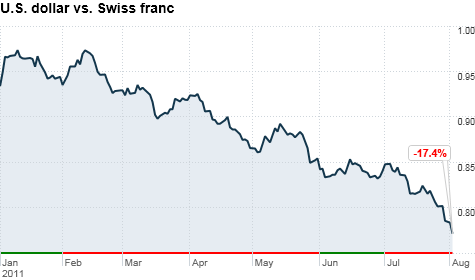Dollar: The 'last-resort' safe haven
August 2, 2011: 2:51 PM ET
The dollar has kept its status as a safe-haven currency, but investors still don't like it as much as the Swiss franc and the Japanese yen. Click the chart for more on currencies.
The deal to raise the debt ceiling and avoid an unprecedented national default helped keep the dollar's safe haven status intact -- giving it a lift against some riskier currencies such as the euro and British pound.
But as concerns about a faltering global economy grow, analysts say the dollar's upside is limited and the Swiss franc and the yen will continue to outshine the buck.
"The dollar has become the safe haven currency of last resort," said Michael Woolfolk, senior currency strategist at Bank of New York Mellon. "The fact that it's still weakening against the Swiss franc and the yen immediately raises a red flag."
The dollar tumbled almost 1.5% to a record low of 0.7719 francs Tuesday morning. It also hit a near-record low against the Japanese yen. Both of those boast safe-harbor appeal.
Safe havens? Gold, the yen and peanut butter
The Swiss franc benefits from that country's lack of credit problems, unlike other beleaguered parts of Europe. The yen is attractive because of the so-called carry trade, where investors take advantage of Japan's low interest rate by borrowing yen to invest in riskier assets.As signs continue to point toward a slowing recovery, the dollar is likely to remain weak.
That's good news for U.S. multinational corporations who rely on strong exports, but a weak dollar acts as a "tax on the consumer" because it eats into their purchasing power, said Michael Mata, portfolio manager at ING Investment Management.
And the Federal Reserve's commitment to maintaining low interest rates and a loose monetary policy will place additional pressure on the dollar.
If the economic recovery continues to deteriorate, the central bank is also more likely to launch another third round of quantitative easing, which would further weigh on the U.S. currency.
"In a sluggish and deflationary world, the yen and Swiss franc will be the winners," said Mata.
No comments:
Post a Comment